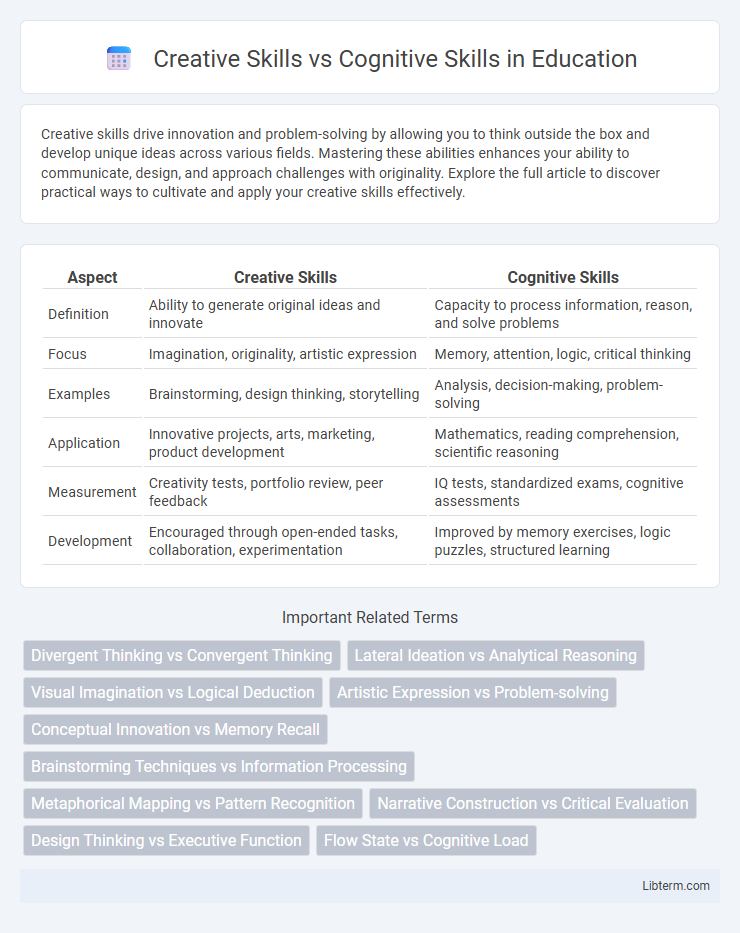Creative skills drive innovation and problem-solving by allowing you to think outside the box and develop unique ideas across various fields. Mastering these abilities enhances your ability to communicate, design, and approach challenges with originality. Explore the full article to discover practical ways to cultivate and apply your creative skills effectively.
Table of Comparison
| Aspect | Creative Skills | Cognitive Skills |
|---|---|---|
| Definition | Ability to generate original ideas and innovate | Capacity to process information, reason, and solve problems |
| Focus | Imagination, originality, artistic expression | Memory, attention, logic, critical thinking |
| Examples | Brainstorming, design thinking, storytelling | Analysis, decision-making, problem-solving |
| Application | Innovative projects, arts, marketing, product development | Mathematics, reading comprehension, scientific reasoning |
| Measurement | Creativity tests, portfolio review, peer feedback | IQ tests, standardized exams, cognitive assessments |
| Development | Encouraged through open-ended tasks, collaboration, experimentation | Improved by memory exercises, logic puzzles, structured learning |
Understanding Creative Skills: Definition and Scope
Creative skills encompass the ability to generate original ideas, solve problems innovatively, and express thoughts through various artistic or conceptual means. These skills involve imagination, intuition, and the capacity to think outside conventional boundaries, enabling unique solutions and artistic expression. Understanding creative skills requires recognizing their role in driving innovation, adaptability, and personal expression across diverse fields and contexts.
What Are Cognitive Skills? A Comprehensive Overview
Cognitive skills encompass essential mental processes such as attention, memory, reasoning, problem-solving, and decision-making that enable individuals to acquire knowledge and adapt to new situations. These skills are fundamental for learning, understanding complex concepts, and executing tasks efficiently across various domains, including education and professional environments. Developing strong cognitive abilities enhances critical thinking and the capacity to process information effectively, distinguishing them from creative skills that emphasize innovation and original thinking.
Key Differences Between Creative and Cognitive Skills
Creative skills involve the ability to generate original ideas, think imaginatively, and approach problems with innovative solutions, focusing on divergent thinking and artistic expression. Cognitive skills encompass mental processes such as reasoning, memory, attention, and problem-solving that enable understanding and processing information efficiently, highlighting convergent thinking and analytical abilities. The key difference lies in creative skills emphasizing novelty and originality, while cognitive skills prioritize logic, information management, and critical evaluation.
The Role of Creativity in Problem-Solving
Creative skills enhance problem-solving by enabling individuals to generate innovative ideas and novel solutions beyond conventional methods. Cognitive skills support this process by facilitating logical reasoning, memory recall, and analytical thinking to evaluate and implement these creative ideas effectively. The integration of creativity and cognition leads to adaptive, efficient problem-solving across complex and dynamic situations.
Cognitive Skills in Analytical Thinking and Decision-Making
Cognitive skills in analytical thinking involve the ability to systematically evaluate information, identify patterns, and make logical connections to solve complex problems effectively. Decision-making relies heavily on cognitive processes such as critical evaluation, prioritization, and risk assessment to select the most appropriate course of action based on available data. Strengthening these cognitive skills enhances one's capacity to process information objectively and reach well-informed, rational decisions in various professional and personal contexts.
How Creative and Cognitive Skills Interact
Creative skills and cognitive skills interact dynamically to enhance problem-solving and innovation by combining divergent thinking with analytical reasoning. Cognitive skills such as memory, attention, and logical analysis provide the structured framework necessary for creative skills like imagination, originality, and flexibility to flourish. This interplay enables individuals to generate novel ideas while effectively evaluating and implementing them in real-world scenarios.
Real-World Applications: Creative vs Cognitive Skills
Creative skills enable innovative problem-solving and design thinking, essential for fields like marketing, arts, and product development where original ideas drive success. Cognitive skills support analytical reasoning, memory, and information processing, crucial for tasks in science, engineering, and data analysis that require accuracy and logical decision-making. Real-world applications often demand a blend of both, such as using cognitive abilities to understand data and creative skills to generate novel solutions.
Enhancing Creative Skills: Practical Strategies
Enhancing creative skills involves engaging in activities that stimulate imagination and innovation, such as brainstorming sessions, artistic endeavors, and problem-solving challenges. Techniques like mind mapping, lateral thinking exercises, and exposure to diverse experiences can significantly boost creative thinking capabilities. Consistent practice in these strategies leads to improved originality and the ability to generate unique solutions beyond standard cognitive skills like memory or analytical reasoning.
Building Strong Cognitive Skills: Effective Techniques
Building strong cognitive skills involves targeted techniques such as problem-solving exercises, memory training, and mindfulness practices that enhance focus and mental agility. Engaging in activities like puzzles, strategic games, and critical thinking tasks stimulates neural pathways, improving reasoning and decision-making abilities. Consistent practice and cognitive challenges promote neuroplasticity, essential for developing robust cognitive functions.
Balancing Creativity and Cognition for Success
Balancing creativity and cognition is essential for achieving success in complex problem-solving and innovation-driven fields. Creative skills enable the generation of novel ideas and approaches, while cognitive skills support critical thinking, analysis, and decision-making. Integrating both skill sets enhances adaptability, strategic planning, and effective execution, driving superior outcomes in personal and professional contexts.
Creative Skills Infographic

 libterm.com
libterm.com